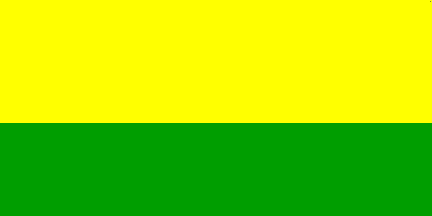
image by Dov Gutterman, 4 August 2008

Last modified: 2008-08-16 by dov gutterman
Keywords: magdalena | cienaga |
Links: FOTW homepage |
search |
disclaimer and copyright |
write us |
mirrors

image by Dov Gutterman, 4 August 2008
See also:
"Ciénaga is a municipality in the Magdalena Department,
second largest population center in this department after the
city of Santa Marta. It is situated between the Sierra Nevada de
Santa Marta, the Caribbean Sea and the Ciénaga Grande de Santa
Marta marsh in northern Colombia. The town is situated north from
Magdalena and at 35 km from Santa Marta. In 1993, there were
121.681 inhabitants (65.357 in urban areas and 56.324 in rural
areas).
Prior to the arrival of the Spanish colonizers the area was
vastly populated by Chimila Indians and a village known as Pongueyca.
The Foundation of Ciénaga has always been a matter of dispute
due to many different historical theories and the lack of
sources. It is believed to be founded first in what is now a
small village known as Pueblo Viejo and the site of a former
Chimila tribe. In 1585 monk Fray Tomás Ortiz established a
Parish that would later burn in a fire. It was then refounded as
city by Fernando de Mier y Guerra under the name of Villa de
San Juan Bautista de la Ciénaga but also was known with the
names of Aldea Grande, Córdoba, Pueblo de la
Ciénaga and simply Ciénaga.
During the war of independence from Spain, Ciénaga became a
battle ground on November 10, 1820 battle between loyalist and
independentists of what became known as the Battle of Ciénaga.
On December 6, 1928 the events of the Santa Marta massacre (in
Spanish, matanza de las bananeras) occurred in this town. It was
a massacre of workers for the United Fruit Company, an unknown
number of workers died after the government decided to send the
military forces to end a month long strike organized by the
workers' union in order to demand better working conditions.
The flag of Ciénaga is horizontally divided yellow-green (~3:2
inner ratio).
Source: wikipedia.
Dov Gutterman and Felipe Carillo, 4 August 2008
magci.jpg)
image from wikipedia